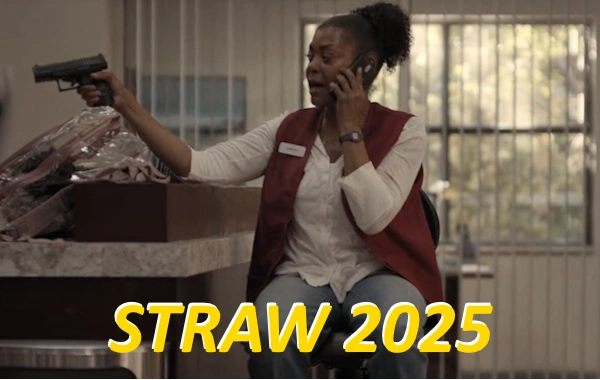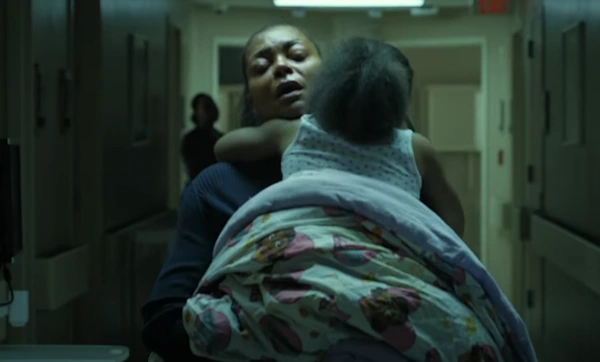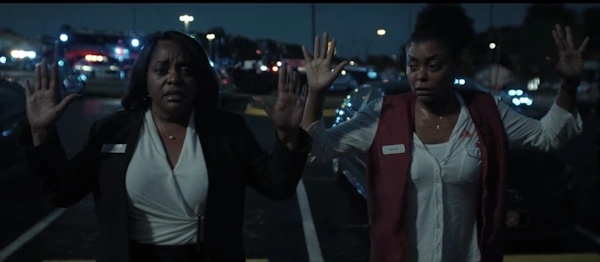“The Last Straw: A Heartbreaking Portrait of a Mother’s Agony” is a fitting description for Straw (2025), the gripping psychological crime drama from prolific filmmaker Tyler Perry. This Netflix original film, released in June 2025, follows the harrowing journey of Janiyah Wiltkinson, a single Black mother whose struggle to care for her ailing daughter while battling poverty, exhaustion, and a seemingly indifferent system pushes her to the edge. The film’s title, “Straw,” is a metaphor for the breaking point—the final, unbearable burden that causes Janiyah’s life to spiral out of control.
From the outset, Straw immerses viewers in Janiyah’s world, one defined by relentless hardship and the constant threat of catastrophe. Living in a cramped, grim apartment with her young daughter Aria, who suffers from severe asthma, Janiyah juggles two jobs and barely scrapes by. Her landlord threatens eviction, her daughter’s school demands overdue lunch fees, and her boss at a grocery store berates her for lack of reliability. The pressures mount, and Janiyah’s support network is nonexistent—her ex is absent, her mother distant, and her sister estranged. As the film unfolds, a series of disastrous events, including a violent robbery at her workplace, forces Janiyah into a desperate act that lands her at the center of a police standoff inside a bank.
What sets Straw apart is its unflinching portrayal of systemic oppression and the emotional toll it exacts on marginalized women. The film is not just a thriller but a social commentary, with Taraji P. Henson delivering a powerhouse performance as Janiyah, whose pain and desperation are palpable. The narrative is punctuated by unexpected twists, including a shocking revelation about Janiyah’s daughter that recontextualizes the entire story. The film’s tension is sustained not by the question of whether Janiyah will snap, but by the heartbreaking inevitability of her downward spiral and the slim hope for redemption.
Director Tyler Perry, known for his prolific output and ability to tackle both comedy and drama, brings his signature style to Straw—fast-paced, emotionally charged, and unafraid to confront difficult truths. The film’s Atlanta setting, shot at Tyler Perry Studios and local landmarks, adds to its authenticity. Despite mixed critical reviews, Straw has resonated deeply with audiences, becoming one of Netflix’s most-watched films of 2025 and sparking conversations about mental health, poverty, and the need for empathy in an increasingly indifferent world.
Straw 2025
- 영어 이름 Straw | Korean 벼랑 끝에 서서 | Japaness ストロー 絶望の淵で
- Directed by Tyler Perry | Screenplay by Tyler Perry
- Produced by Tyler Perry, Angi Bones, Tony Strickland
- Music by Dara Taylor
- Starring Taraji P. Henson, Sherri Shepherd, Teyana Taylor, Sinbad, Rockmond Dunbar, Glynn Turman, Ashley Versher, Mike Merrill, Shalet Monique
- Production companies Tyler Perry Studios
- Distributed by Netflix
- Release dates June 6, 2025
- Running time 105–108 minutes
- Country United States
- Language English
- Budget –
- Box office –
- Rating –

Table of Contents
Movie Straw rating
로튼 토마토 50% (critics), 74% (audience Popcornmeter)
IMDB 6.2/10 (as of June 2025)
Director Tyler Perry’s filmography, style
Tyler Perry is one of the most prolific filmmakers in Hollywood, known for his rapid production pace and ability to blend comedy, drama, and social commentary. He is best known for the Madea franchise, which he writes, directs, and stars in, as well as numerous television series such as House of Payne and The Haves and the Have Nots. Perry’s style is characterized by emotionally charged storytelling, strong performances, and a focus on issues affecting the Black community. For Straw, Perry drew inspiration from the struggles of single mothers and the compounding pressures of poverty and systemic neglect. The film was shot in just four days, a testament to Perry’s legendary efficiency and the dedication of his cast and crew.
Movie Straw starring
Janiyah Wiltkinson (Taraji P. Henson – Instagram @tarajiphenson)
Selected filmography : Hidden Figures (2016): Plays mathematician Katherine Johnson, a key figure in NASA’s early space missions.
The Curious Case of Benjamin Button (2008): Plays Queenie, the foster mother of Benjamin Button.
Nicole (Sherri Shepherd – Instagram @sherrieshepherd)
Detective Kay Raymond (Teyana Taylor – Instagram @teyanataylor)
Straw plot summary

Janiyah, a Black woman, lives alone raising her frequently ill eight-year-old daughter. She works two jobs to make ends meet, but the exorbitant cost of her daughter’s seizure medication pushes her to the brink of extreme poverty. Her home is in disarray, sometimes the gas is cut off, forcing her to shower with cold water, and she is on the verge of being evicted because she can’t pay the rent. Her daughter can’t even afford school lunch.
As Janiyah leaves home, she gives change to a neighbor in a wheelchair, which angers her landlord, who threatens to evict her if she doesn’t pay the rent by 10 a.m. Janiyah takes her daughter to school as usual and heads to the supermarket where she works.
Her daughter is unusually difficult that day, making Janiyah late, and the store manager scolds her. She asks for an advance on her paycheck to pay for her daughter’s lunch, but is refused. After dropping her daughter off at school, Janiyah goes to work at the supermarket.
Suddenly, she gets a call from her daughter’s school and asks the manager for permission to leave temporarily. She tries to scrape together money from her bank account for her daughter’s lunch, but ultimately can’t get enough and goes to the school empty-handed. However, the school has already reported her to child protective services, believing she can no longer properly care for her daughter, and the agency takes her daughter away.
Losing her daughter sends Janiyah into a panic, and while driving, she accidentally gets into trouble with a car driven by a police officer on vacation. The officer retaliates with aggressive driving, causing Janiyah to get into an accident. The person who retaliated turns out to be a cop, and the colleague who arrives to handle the accident impounds Janiyah’s car because she can’t pay the fine. The officer threatens to shoot Janiyah if he ever sees her again.
The landlord evicts Janiyah for not paying rent and throws her belongings outside in the pouring rain. Janiyah, crying, grabs only her daughter’s science fair project and her medication and returns to the supermarket. She barely makes it back, but the manager fires her for being away too long.
Janiyah asks for the paycheck she earned, but is told that fired employees get their pay by mail three days later. She goes to the supermarket to protest, but at that moment, two armed robbers burst in and one demands her daughter’s bag. When Janiyah refuses, she is assaulted.
During the struggle with the robber, the robber is accidentally shot and killed. The manager suspects Janiyah was in on the robbery and tries to report her. The manager accuses Janiyah of staging the robbery and calls 911, but Janiyah explains that the robber saw her name tag and called her by name. In a panic, Janiyah shoots and kills the manager, takes her paycheck, and flees.
She goes to the bank across the street with the blood-stained check, asking to cash her $521 paycheck. The teller refuses because she doesn’t have ID. Desperate, Janiyah pulls out a gun, and the teller finally complies but activates a silent alarm.
Meanwhile, the people inside mistake her daughter’s science project for a bomb, and the situation escalates, bringing in the FBI. A series of tragic events and coincidences push Janiyah to her limit, and she inadvertently becomes a bank robber and a bomb suspect, holding everyone inside hostage.
Straw Ending spoiler

During the standoff with the police inside the bank, the female detective investigating the supermarket murder and the bank manager try to understand Janiyah’s desperate situation and work to resolve the incident on her side. Janiyah’s story spreads online, and many people begin to support her.
A bank employee, Tessa, writes a message on the bathroom window revealing that the “bomb” in Aria’s bag is actually a science project. Raymond tracks down the police officer who harassed Janiyah and detains him. Janiyah asks the FBI to confirm the officer’s identity, but when they refuse, Raymond sends a photo to Nicole. Janiyah releases the hostages only after identifying the officer, but only Nicole stays by her side.
Janiyah receives a call from her mother, who reminds her that Aria died of a seizure the night before. Flashbacks reveal that Aria being with her all day was Janiyah’s hallucination. The school and CPS never actually contacted her, and Nicole stayed to protect Janiyah, knowing Aria had died.
Janiyah’s daughter had already died the night before from a severe seizure. Janiyah, unable to accept the reality, lived the whole day in a fantasy of trying to get her daughter’s lunch money and medicine, leading to these events. Standing on the edge and struggling, Janiyah finally faces the truth.
Realizing her daughter is dead, Janiyah is persuaded by the bank manager and the female detective to release the hostages and walks out of the bank. She is led away in handcuffs, her face filled with despair as if she has lost everything.
Straw Ending Interpretation
“Standing on the Edge” vividly portrays the lives of the socially vulnerable and marginalized. Janiyah sinks deeper into despair amid economic poverty, social prejudice, and the loss of her family. The film goes beyond simply showing the protagonist’s misfortune, questioning the social structure around her, human compassion, and the possibility of hope.
The final twist reveals that Janiyah finds a glimmer of hope in her desperate reality, but in the end, realizes everything was an illusion. She struggles all day for her daughter, only to find out her daughter was already gone—a heartbreaking conclusion.
“You don’t know how expensive it is to be poor.” — A famous line from “Standing on the Edge”
Is “Straw” Based on a True Story?
Director Tyler Perry has said he based the story on his own life and the hardships of many single mothers he has seen, as well as the reality of those lacking social support. There have been real cases of people robbing banks due to medical or living expenses, such as a 2000 incident in Canada where a bank manager was forced to rob a bank with her daughter, and a 2010 case in Oregon where a single mother robbed a bank to pay rent.
The director drew inspiration from the real struggles of Black single mothers, economic hardship, and systemic exclusion. While there have been real bank robberies (such as the 2000 Canadian bank manager case and the 2010 Oregon single mother case), the film is a fictional story only inspired by these events.
Straw Review
Taraji P. Henson reportedly read the script and was so emotionally moved that she immersed herself deeply in the role. Her realistic acting makes viewers feel like they are watching a real situation, even as it turns into a hallucination. It is not a flashy blockbuster or a true story, but it portrays reality more vividly than any other film.
Janiyah Wiltkinson, a single mother struggling to care for her sick daughter, Aria, faces mounting pressures from every direction. She is threatened with eviction, harassed by her daughter’s school, and berated by her boss. After a violent robbery at her workplace, Janiyah is forced to take drastic action to protect her check, leading her to a bank where she becomes embroiled in a hostage situation. As the police surround the bank, Janiyah’s mental state unravels, and the true extent of her suffering is revealed through a series of flashbacks and hallucinations.
[K movie] A Company Man Plot Summary Ending Cast (2012)
- The Practical Guide to Love Ending & plot summary & Cast
- Choi Gaon: Snowboard Halfpipe Olympic Gold Medalist, After Battling a Spinal Fracture
- Diablo 2’s New Character Update in 25 Years ‘Warlock’
- Single’s Inferno Season 5 Mina Sue Choi miss earth 2022, age, insta
- Single’s Inferno Season 5 Cast & Instagram




